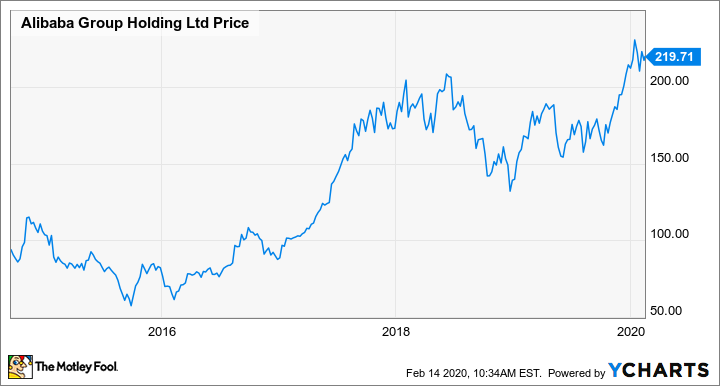The expression "May you live in interesting times" may not be of Chinese origin, but "interesting times" certainly describes the current state of Alibaba (BABA 2.12%). The Chinese e-commerce giant beat consensus estimates for both earnings and revenue in its fiscal 2020 third-quarter report released last week. It also pulled off a Nov. 26 initial public offering on the Hong Kong stock exchange (it is already traded publicly in the U.S.) amid heavy political turmoil in that special administrative region of China.
With the coming of the new year, attention has now shifted to a dangerous virus outbreak that has slowed economic activity in China even more than it had already slowed in 2019. The question for investors now is how this will affect Alibaba and other Chinese stocks. Alibaba's share price may not yet reflect the novel coronavirus full adverse effects on its short-term revenue and earnings, but all indications are that the impact will likely not change the long-term trajectory of the company's growth.

Image source: Getty Images.
Alibaba's short term results and concerns about long-term virus effects
The company reported revenue of 161.5 billion yuan ($23.2 billion) during Q3 of fiscal 2020. This is a 38% increase from the same quarter last year. It reported 55.9 billion yuan ($8.0 billion) in adjusted EBITDA for the quarter (up 37% year over year). Diluted earnings per ADS were $2.81, up 55% year over year. Despite what appear to be strong numbers, the market's reaction was muted, as Alibaba stock fell about 2% immediately following the report.
With the company in the middle of Q4 of fiscal 2020, the unknown looming over Alibaba earnings and the Chinese economy, in general, is COVID-19, the illness caused by a novel coronavirus. Health experts discovered the virus in Wuhan, China, in early December, but it didn't receive worldwide attention until mid-January. For this reason, it likely had no substantial effect on Q3 earnings. Nonetheless, the company mentioned in the report that it is "mobilizing its ecosystem" to fight off potential financial effects of the outbreak.
Following some initial negative reaction to the coronavirus, it has had little real effect on Alibaba stock so far and, I suspect, will likely not change anything in the long term. Here's why.
Alibaba is still a bargain
Just as it did before the virus scare, Alibaba stock has looked and continues to look like a bargain. The stock trades at a forward price-to-earnings ratio of 25.1, near the S&P 500 average P/E of 22.4. Still, with expected profit growth of 28.3% this year and 22.6% in 2021, that multiple seems like a bargain. The growth it's producing should continue for years as this country of nearly 1.4 billion sees more of its population join the ranks of the middle class and becomes more active online.
Also, despite this seemingly inexpensive valuation, Alibaba trades within 5% of its all-time high. This stock has never received the respect of its U.S. counterpart Amazon, which has long traded at a higher P/E ratio. Part of the problem may be that Alibaba shares are not actually stock in Alibaba: Since foreign investors cannot directly own stock in Chinese companies, investors own shares in a Cayman Islands-based holding company linked to Alibaba. However, shareholders have dealt with that issue from the beginning.
How coronavirus and the Chinese economy affect Alibaba
Coronavirus can certainly have short-term effects on the company. The number of COVID-19 cases now exceeds 73,000 as of this writing, and the Invesco DB Commodity Index Tracking Fund has fallen by 8.8% since Jan. 6, pointing to lower economic activity. Moreover, economists had forecast declining economic activity in China even before the virus became an issue. Government officials reported that the Chinese economy grew at just 6% in 2019, the lowest figure since 1992.
The Chinese government has attempted some stimulus measures in response. However, with workers and consumers more concerned about avoiding coronavirus than taking advantage of stimulus measures, it may do little good short term.
For now, investors should monitor the stock closely and anticipate the potential for more short-term fallout from the coronavirus. But once concerns ease, expect investors to again be buying Alibaba stock as it's likely the company will return to its expected high growth levels.






